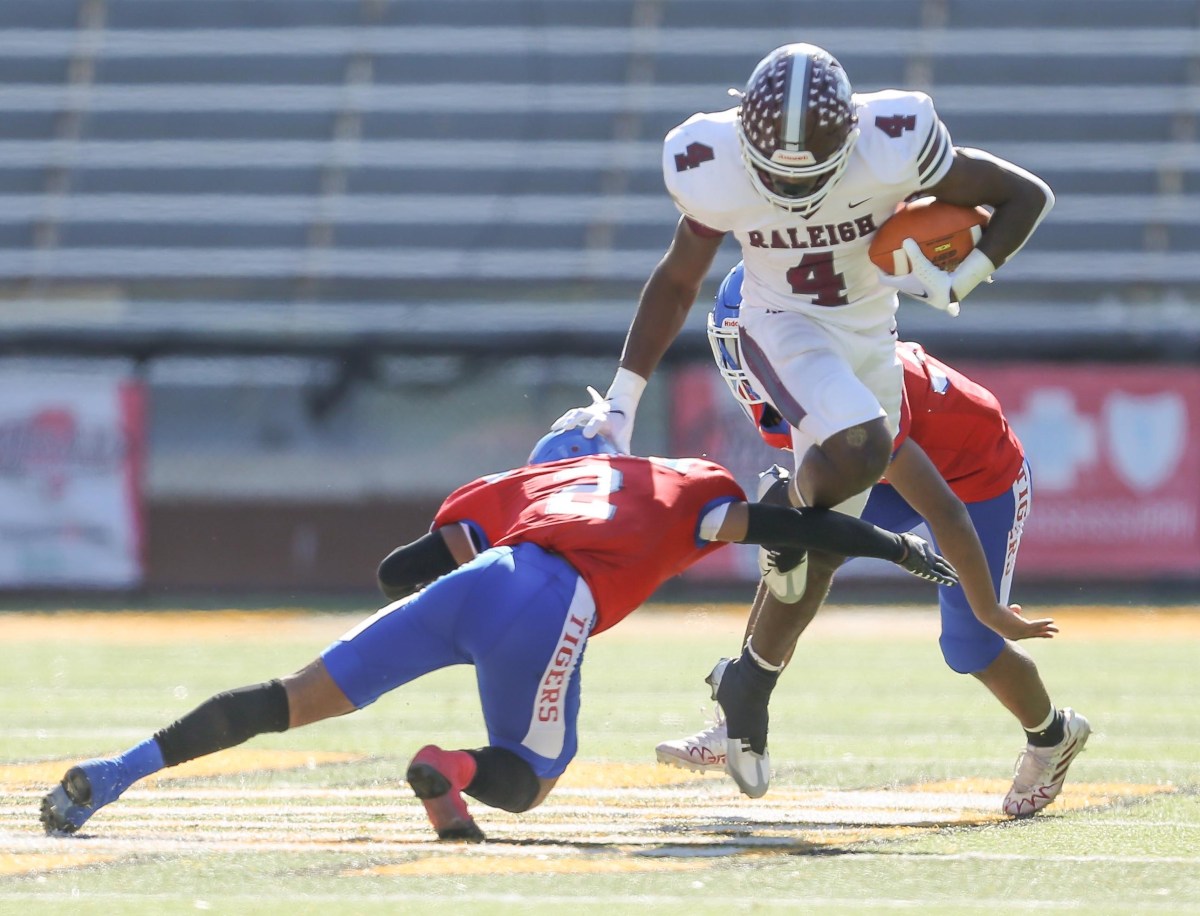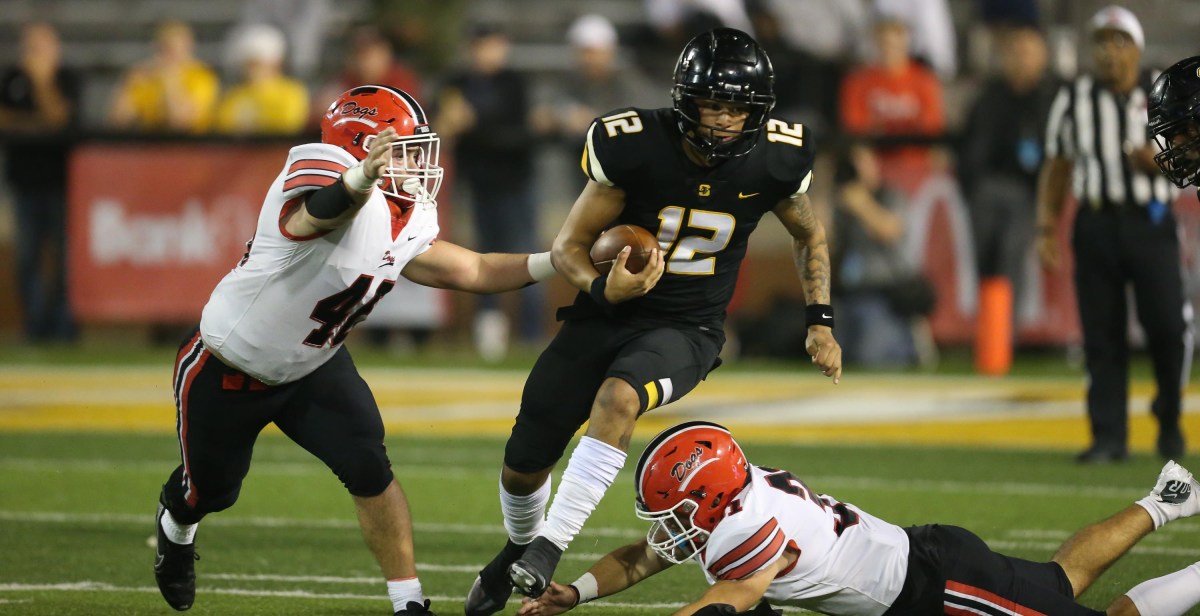Mississippi Today
Six state championships display thrill of victory, agony of defeat
Six state championships display thrill of victory, agony of defeat
HATTIESBURG — The Mississippi High School Activities Association State Football Championships rarely disappoint when it comes to drama – the thrill of victory and the agony of defeat, as “Wide World of Sports” Hall of Fame broadcaster Jim McKay famously put it.
The 2022 championship games, played Friday and Saturday at The Rock at Southern Miss, were no exception. The weekend produced shootouts – such as Raleigh’s 55-52 triumph over Noxubee County in the Class 3A game – and defensive struggles, such as Lousville’s 17-14 conquest of Mendenhall in the Class 4 A championship.
We saw some of the state’s most highly recruited college prospects, streamlined physical athletes such as Raleigh’s Suntarine Perkins and Picayune’s Dante Dowdell. We saw magnificent high school players such as Scott Central’s bowling ball of a quarterback, Quez Goss (5-feet, 9 inches, maybe, and 220 pounds). Get this: In back to back state championships, Goss has produced a total of 14 touchdowns, while his Scott Central team has scored 112 points.
Picayune, winning its second straight 5A championship, emerged as the state’s only undefeated team. With seemingly the entire citizenry of Picayune filling the lower deck on the east side at The Rock, the Maroon Tide finished a perfect 15-0 with only one victory coming by fewer than 10 points.
Louisville won its 11th state championship, tying it with West Point for most football state championships among Mississippi public schools.
Starkville’s championship season deserves special recognition. The Yellowjackets, beset by a brutal schedule and key injuries, lost three straight games in September and October before regrouping to win its last eight, including four straight in the playoffs. Asked who made up that brutal schedule, Jones responded, “I did. You don’t get any better playing cupcakes.”
So, let’s recap the games in the order they were played.

Class 3A: Raleigh 55, Noxubee County 52
What a way to start the weekend: In Raleigh’s 55-52 Class 3A championship victory over Noxubee County, the two teams combined for a MHSAA playoffs record 107 points – not to mention 14 touchdowns, 45 first downs and nearly 1,000 yards of offense. There were only two punts, both by Noxubee.
Rarely, if ever, has an MVP trophy belonged to a more obvious winner. Suntarine Perkins, Raleigh’s do-it-all superstar, provided 331 yards and four touchdowns rushing. He caught three passes for 56 yards. He kicked off. He led his team in tackles and he made a crucial fourth quarter interception to preserve the victory.
Perkins, a heavily muscled, 6-foot-3, 205-pound player, showed why virtually every college coach in the country would love to have him and why Ole Miss head coach Lane Kiffin and Alabama defensive coordinator Pete Golding watched the game from field level, just behind the north end zone. Afterward, Perkins confirmed that Ole Miss, to whom he has verbally committed, and Alabama, are the last two suitors he is considering. One or the other is going to get a remarkable athlete – and take a huge NIL hit – when Perkins signs on the dotted line. He said that will happen “sometime in December.”
It took all of Perkins’ heroics to get the victory. Noxubee County, a perennial Mississippi high school powerhouse, fought all the way to the final gun. Keep this name in mind for future reference: Kamario Taylor. Just a 10th grader, the long-limbed, 6-4, 180-pounder kept Noxubee in it, throwing for five touchdowns.
Taylor was marvelous, but Perkins was even better. He sprinted 74 yards for a touchdown, out-running much smaller people, the first time he touched it. He was just getting started.
Asked how he felt afterward, Perkins smiled. “Real good,” he said, “but my legs I gotta admit are a little tired.”

Class 1A: Bay Springs 22, McEvans 0
Mississippi State commit Tyrick Jones rambled for 136 yards and two touchdowns on 16 carries but it was the Bay Springs defense, which much included Jones, that sparked the Bulldogs to the school’s second straight state championship. After Friday’s first game produced 107 points, Bay Springs allowed none, serving to reinforce the age-old adage: Defense wins championships.
Bay Springs did not complete a single pass, but ran for 270 yards and allowed McEvans only 149 yards of total offense. Why throw it if you don’t need to?
It was Bay Springs’ sixth shutout of the season and the 11th time the Bulldogs have held an opponent to one score or fewer scores. McEvans had averaged 42 points per game in three previous playoffs victory but couldn’t crack the Bay Springs defense, which did not give up a score in four playoffs games.
Said Jones, a 225-pounder who likely will play on the defensive side of the ball at State, “Our plan was to run the ball down their throat, and that’s what we did. We were going to pound and pound it until they quit.”

Class 5A: Picayune 31, West Point 21
Defending State 5A Champ Picayune fell behind perennial powerhouse West Point 14-3 Friday night but there was no panic along the Maroon Tide sidelines. When you have a stable of running backs, led by four star recruit Dante Dowdell, why panic?
After running for 190 yards and three touchdowns, Dowdell, the MVP, explained, “We’ve got a lot of guys that have heart. When we get a head of steam and start going downhill, we’re hard to stop.”
Chris Smith also ran for 104 yards for the Maroon Tide, which was playing West Point in the state championship game for the second consecutive year. Dowdell, who stands 6 feet, 1 inch and weighs 215 pounds, displayed a remarkable blend of speed and power against a normally salty West Point defense.
“He’s a great player,” Picayune coach Cody Stogner said of Dowdell. “Sometimes you just gotta let a great player play. We’ve had him for four years, and he’s just gotten better and better every year. We lean on him heavily, and we did again tonight. Like always, he delivered.”

Class 4A: Louisville 17, Mendenhall 14
Make that 11 for 11 for the Lousville Wildcats. After defeating Mendenhall 17-14 for the 4A State Championship Saturday, the Wildcats have advanced to a state championship game 11 times. They have won all 11. None could have been any more difficult than the three-point victory over the Mendenhall Tigers.
Junior Ceidrick Hunt booted a 27-yard field goal as time expired to give Louisville the winning margin in a game mostly dominated by the two defenses.
You think there isn’t pressure to win in a tradition-rich program such as Louisville? “I didn’t want to be the first coach (at Louisville) to come down here and lose in the finals,” said Louisville head coach Tyrone Shorter.
It looked like that might happen. Mendenhall was driving late in the fourth quarter when the Wildcats forced the game’s only turnover. Senior Gabe Moore forced a fumble, which was recovered by sophomore Ja’cari Owens at the Mendenhall 43-yard-line with 32 seconds remaining in regulation. Senior quarterback Keyarrion Jackson led a short drive to produce the game-winning field goal.
Louisville is now tied with West Point for most state championships among Mississippi public schools teams. Both have won 11. Said Jackson, “Now we’re part of the legacy.”

Class 2A: Scott Central 42, Charleston 12
Next season, the Class 2A State Championship can be someone else’s playground. Scott Central quarterback Quez Goss won’t be around to show off again. Goss, who accounted for eight touchdowns in Scott Central’s 70-26 romp over Leflore County last December, was responsible for six more in the Rebels’ 42-12 pasting of Charleston Saturday.
Goss plays a lot taller than his 5 feet, 9 inches. He throws the deep ball with uncanny accuracy. And he throws primarily to two senior wide receivers who can go up and get it. Southern Miss commit Javieon Butler hauled in five catches for 131 yards and two touchdowns, while Antreyvious Edwards had three catches for 133 yards and three touchdowns.
“When you’ve got guys like those, it makes my job so much easier,” Goss said. “I just launch it downfield and let them go get it.”
Goss was being overly modest. He finished 9-of-14 passing for 281 yards with five touchdowns and also added a rushing touchdown. He was a clear cut for choice for MVP for a second consecutive season.
Since 1999, Scott Central has won four state championships and been the runner-up twice.

Class 6A: Starkville 48, Brandon 32
Oddsmakers don’t make point spreads for high school football games, but powerhouse Brandon, which entered at 12-1, would have been favored over a Starkville team that started 0-3 in its own region this season. But Starkville took control at the beginning and coasted to the championship victory.
Junior quarterback Trey Petty led the way, throwing for two touchdown and running for three more. He was named the MVP but Starkville coach Chris Jones had another name for him. “He’s a dog,” Jones said. “I’m happy he’s on my team. He does a good job, and has been doing a good job all year. He had a rough patch early in the year when he was struggling and playing through injuries, but he bounced back. That’s what champions do.”
Starkville scored on seven of its 10 possessions and four of its first six. The Yellowjackets led 21-3 at halftime and then 28-3 early in the third quarter. Brandon finally got its offense in gear in the second half, but by then it was too late. Quarterback Landon Varnes passed for 297 yards and halfback Nate Blount powered for 184 yards on 24 carries, but it was not nearly enough.
The championship was the seventh in Starkville history but the first since 2015. Chris Jones has now won state championships at both Kemper County and Starkville.
This article first appeared on Mississippi Today and is republished here under a Creative Commons license.
Mississippi Today
Pharmacy benefit manager reform likely dead
Hotly contested legislation that aimed to increase the transparency and regulation of pharmacy benefit managers appeared dead in the water Tuesday after a lawmaker challenged the bill for a rule violation.
The bill was sent back to conference after Rep. John Hines, D-Greenville, raised a point of order challenging the addition of code sections to the bill, which will likely kill it.
House members in the past have chosen to turn a blind eye to the rule, which would require the added code sections to be removed when the bill is returned to conference. This fatal flaw will make it difficult to revive the legislation.
“It will almost certainly die,” said House Speaker Jason White, who authored the legislation. “And you can celebrate that with your pharmacist when you see them.”
“…This wasn’t ‘gotcha.’ Everybody in this chamber knew that code sections were added, because the attempt was to make 1123 more suitable to all the parties.”
The bill sought to protect patients and independent pharmacists, who have warned that if legislators do not pass a law this year to regulate pharmacy benefit managers, which serve as middlemen in the pharmaceutical industry, some pharmacies may be forced to close. They say that the companies’ low payments and unfair business practices have left them struggling to break even.
The bill underwent several revisions in the House and Senate before reaching its most recent form, which independent pharmacists say has watered the bill down and will not offer them adequate protection.
House Bill 1123, authored by White, originally focused on the transparency of pharmacy benefit managers. The Senate then beefed up the bill by adding provisions barring the companies from steering patients to affiliate pharmacies and prohibiting spread pricing – the practice of paying insurers more for drugs than pharmacists in order to inflate pharmacy benefit managers’ profits.
Independent pharmacists, who have flocked to the Capitol to advocate for reform this session, widely supported the Senate’s version of the bill.
The Senate incorporated several recommendations from the House into its bill, saying that they believed that the legislation would have the House’s support.
Instead, the House sent the bill to conference and requested additional changes, including new language that would eliminate self-funded insurance plans, or health plans in which employers assume the financial risk of covering employees’ health care costs themselves, from a section of the bill that prohibits pharmacy benefit managers from steering patients to specific pharmacies.
This language seeks to satisfy employers, who argue that regulating pharmacy benefit managers’ business practices will lead to higher health insurance costs.
Sen. Rita Parks, R-Corinth, who has spearheaded pharmacy benefit manager reform efforts in the Senate, previously said that adding the language to the bill would “remove any protection out of the law.” But she signed the conference report that included the language Monday after a heated conference meeting between lawmakers.
Rep. Hank Zuber, R-Ocean Springs and co-author of the bill, said the bill has something for everybody, gesturing to its concessions for employers and independent pharmacists. He said the bill gives independent pharmacists 85% of what they wanted.
Mississippi Independent Pharmacies Association director Robert Dozier was not available for comment by the time the story published.
Zuber told House members Tuesday to “blame the Senate” for the slow progress of pharmacy benefit manager reform in Mississippi, citing the body’s failure to take up a drug pricing transparency bill half a decade ago, for three years in a row.
“If the Senate had followed the leadership and the legislation that we drafted those many years ago, we would not be here,” Zuber said. “We would have the information on drug pricing, we would have the information and transparency on (pharmacy benefit managers) and we would have the ultimate reason as to why drug costs continue to rise.”
Members of the House expressed dissatisfaction with the legislation Tuesday, arguing it did not do enough to ensure lower prescription drug costs for consumers.
“I’m going to try to do something next year that goes even further,” Zuber responded.
For the past several years, lawmakers have proposed bills to regulate pharmacy benefit managers, but none have made it as far as this session.
“We’ll go another year,” said White.
This article first appeared on Mississippi Today and is republished here under a Creative Commons license.![]()
Mississippi Today
Feuding GOP lawmakers prepare to leave Jackson without a budget, let governor force them back
After months of bitter Republican political infighting, the Legislature appears likely to end its session Wednesday without passing a $7 billion budget to fund state agencies, potentially threatening a government shutdown if they don’t come back and adopt one by June 30.
After the House adjourned Tuesday night, Speaker Jason White said he had presented the Senate with a final offer to extend the session, which would give the two chambers more time to negotiate a budget. As for now, the 100 or so bills that make up the state budget are dead.
The Senate leadership was expected to meet and consider the offer Tuesday evening, White said. But numerous senators both Republican and Democrat said they would oppose such a parliamentary resolution, and Lt. Gov. Delbert Hosemann has also said it’s unlikely and that the governor will have to force lawmakers back into special session.
White said he believes, if the Senate would agree to extend the session and restart negotiations, lawmakers could pass a budget and end the 2025 session by Sunday, only a few days later than planned.
But if the Senate chooses not to pass a resolution extending the session, White said the House would end the session on Wednesday.
It would take a two-thirds vote of support in both chambers to suspend the rules and extend the session. The Senate opposition appears to be enough to prevent that.
Still, the speaker said he believes Lt. Gov. Delbert Hosemann and Senate leaders are considering the proposal. But he said if he doesn’t hear a positive response by Wednesday, the House will adjourn and wait for Gov. Tate Reeves to call a special session at a later date.
“We are open to (extending the session), but we will not stay here until Sunday waiting around to see if they might do it,” White said.
White said leaving the Capitol without a budget and punting the issue to a special session might not cool tensions between the chambers, as some lawmakers hope.
“I think when you leave here and you end up in a special session, some folks say, ‘Well everybody that’s upset will cool down by then.’ They may, or it may get worse. It may shine a different and specific light on some of the things in this budget and the differences in the House and Senate,” White said. “Whereas, I think everybody now is in the legislative mode, and we might get there.”
The Mississippi Constitution does not grant the governor much power, but if Gov. Tate Reeves calls lawmakers into a special session, he gets to set the specific legislative agenda — not lawmakers.
White said the governor could potentially use his executive authority to direct lawmakers to take up other bills, such as those related to education, before getting to the budget.
“When we leave here without a budget, it is entirely the governor’s prerogative to when he (sets a special session) and how he does that.”
While the future of the state’s budget hangs in the balance, lawmakers have spent the remaining days of their regular session trying to pass the few remaining bills that remained alive on their calendars.
House approves DEI ban, Senate could follow suit on Wednesday
The House on Tuesday passed a proposal to ban diversity, equity and inclusion programs from public schools, and both chambers approved a measure to establish a form of early voting.
The House approved a conference report compromise to ban DEI programs and a list of “divisive concepts” from K-12 schools, community colleges and universities. If the Senate follows suit, Mississippi would join a number of other Republican-controlled states and President Donald Trump, who has made rooting DEI out of the federal government one of his top priorities.
The agreement between the Republican-dominated chambers follows hours of heated debate in which Democrats, all almost of whom are Black, excoriated the legislation as a setback in the long struggle to make Mississippi a fairer place for minorities. Legislative Republicans argued the legislation will elevate merit in education and remove from school settings “divisive concepts” that exacerbate divisions among different identity groups.
The concepts that will be rooted out from curricula include the idea that gender identity can be a “subjective sense of self, disconnected from biological reality.” The move reflects another effort to align with the Trump administration, which has declared via executive order that there are only two sexes.
The House and Senate disagreed on how to enforce the act, but ultimately settled on an agreement that would empower students, faculty members and contractors to sue schools for violating the law, but only after they go through an internal campus review process that would give schools time to make changes. The legislation could also withhold state funds from schools that don’t comply.
Legislature sends ‘early voting lite’ bill to governor
The Legislature also overwhelmingly passed a proposal to establish a watered down version of early voting, though the legislation is titled “in-person excused voting,” and not early voting.
The proposal establishes 22 days of in-person voting before Election Day that requires voters to go to the circuit clerk’s office or another location county officials have designated as a secure early voting facility, such as a courtroom or a board of supervisors meeting room.
To cast an early vote, someone must present a valid form of photo ID and list one of about 15 legal excuses to vote before Election Day. The excuses, however, are broad and would, in theory, allow many people to cast early ballots.
Examples of valid excuses are voters expecting to work on Election Day, being at least 65 years old, being currently enrolled in college or potentially travelling outside of their county on Election Day.
Since most eligible voters either work, go to college or are older than 65 years of age, these excuses would apply to almost everyone.
“Even though this isn’t early voting as we saw originally, it makes this more convenient for hard working Mississippians to go by their clerks’ office and vote in person after showing an ID 22 days prior to an election,” Senate Elections Chairman Jeremy England said.
Republican Gov. Tate Reeves opposes early voting, so it’s unclear if he would sign the measure into law or veto it.
Both chambers are expected to gavel at 10 a.m. on Wednesday to debate the final items on their agenda.
This article first appeared on Mississippi Today and is republished here under a Creative Commons license.
Mississippi Today
‘A lot of us are confused’: Lacking info, some Jacksonians go to wrong polling place
Johnny Byrd knew that when his south Jackson neighborhood Carriage Hills changed wards during redistricting last year, his neighbors would have trouble finding their correct polling place on Election Day.
So he bought a poster board and inscribed it with their new voting location – Christ Tabernacle Church.
“I made a sign and placed it in front of the entrance to our neighborhood that told them exactly where to go so there would be no confusion,” said Byrd, vice president of the Association of South Jackson Neighborhoods.
Still, on April 1, a car full of voters from a senior living facility who should have gone to Christ Tabernacle were driven to their old polling place.
“I thought it was unfortunate they had to get there and find out rather than knowing in advance that their polling location was different,” said Sen. Sollie Norwood, a Democrat from Jackson who was on the ground Tuesday helping constituents with voting.
One of those elderly women became frustrated and said she no longer wanted to vote, Norwood said, though her companions tried to convince her otherwise. By midday Tuesday, 300 people had voted at Christ Tabernacle, one of the city’s largest precincts currently in terms of registered voters, but among the lowest in turnout historically.
Voting rights advocates and candidates vying for municipal office in Jackson are keeping an eye on issues facing voters at the polls, though without official results, it remains to be seen if that will dampen turnout this election with the hotly contested Democratic primary.
“I still believed it was gonna be low,” Monica McInnis, a program manager for the nonprofit OneVoice, said of turnout. “I was expecting it would be a little higher because of what is on the ballot and how many people are running in all of the wards as well as the mayor’s race.”
The situation is evolving as the day goes on, but the main issues are twofold. One, thousands of Jackson voters have new precinct locations after redistricting last year put them into a new city council ward.
Two, some voters didn’t realize their polling place for the municipal elections may differ from where they voted in last year’s national elections, which are run by the counties.
In Mississippi, voters are assigned two precincts that are often but not always the same: A municipal location for city elections and a county location for senate, gubernatorial and presidential elections
“People in Mississippi, we go to the same polling location for three years, and that fourth year, it changes,” said Jada Barnes, an organizer with the Jackson-based nonprofit MS Votes. “A lot of us are confused. When people are going to the polling place today, they’re seeing it is closed, so they’re just going back home which is making turnout go even lower.”
Barnes said she’s hearing this primarily from a few Jackson voters who called a hotline that MS Votes is manning. Lack of awareness around polling locations is a big deterrent, she said, because most people are trying to squeeze their vote in between work, school or family responsibilities.
“Maybe you’re on your lunch break, you only got 30 minutes to go vote, you learn that your polling location has changed and now you have to go back to work,” she said.
Norwood said he heard from a group of students assigned to vote at Christ Tabernacle who had attempted to vote at the wrong precinct and were told their names weren’t on the rolls. They didn’t know they had been moved from Ward 4 to Ward 6, Norwood said, meaning they expected to vote in a different council race until reaching the polls Tuesday.
Though voters have a duty to be informed of their polling location, Barnes said city and circuit clerks and local election commissioners are ultimately responsible for making sure voters know where to go on Election Day.
Angela Harris, the Jackson municipal clerk, said her office worked to inform voters by mailing out thousands of letters to Jacksonians whose precincts changed, including the roughly 6,000 whose wards changed during the 2024 redistricting.
“I am over-swamped,” she said yesterday.
Despite her efforts, at least one voter said he never got a letter. Stephen Brown learned through Facebook, not an official notice, that he was moved from Ward 1 to Ward 2.

A resident of the Briarwood Heights neighborhood in northeast Jackson, Brown’s efforts to vote Tuesday have been complicated by mixed messages and a lack of communication. He has yet to vote, even though he showed up at the polls at 7:10 this morning.
His odyssey took him to two wrong locations, where the poll managers instructed Brown to call his ward’s election commissioner, who did not answer multiple calls, Brown said. Brown finally learned through a Facebook comment that he could look up his new precinct on the Mississippi Secretary of State’s website — if he scrolled down the page past his county precinct information.
This afternoon, Brown has a series of meetings planned, so now he’s hoping for a 30-minute window to try voting one more time, even though he’s skeptical it will make a difference.
“I’m a very disenchanted voter, because I’ve been let down so much,” he said. “I vote because it’s the thing that I’m supposed to do and because of the sacrifices of my ancestors, but not because I truly believe in it, you know?”
Brown’s not alone in facing turbulence. Back at Christ Tabernacle, one Jackson voter, who declined to give her name, said she’s frustrated from having to drive to three polling locations in one day.
“I’m dissatisfied with the fact that I had to drive from one end of this street and all of the back to come over here when I usually vote over here on Highway 18,” she said. “This was a great inconvenience, gas wise and time wise.”
The same thing happened to Rodney Miller. He called the confusion some voters are facing in this election “unnecessary.”
“That ain’t the way we should be handling business,” he said. “We should be looking out for one another better than that, you know? It’s already enough getting people out to vote, and when you confuse them when they try? Come on now. That’s discouraging.”
Christ Tabernacle is the second largest precinct in the city in terms of registered voters, with 3,330 assigned to vote there as of 2024, according to documents retrieved from the municipal election committee. But it had one of the lowest voter turnout rates – 10% in the 2021 primary election before redistricting and before it became so large.
Byrd mentioned the much higher turnout in places like Ward 1 in northeast Jackson, compared to where he lives in south Jackson. Why does Byrd think this is?
“Civics,” Byrd said. “They took civics out of school. If you ask the average person what is the role and responsibility of any elected official, they can’t tell you.”
This article first appeared on Mississippi Today and is republished here under a Creative Commons license.![]()
-

 News from the South - Florida News Feed6 days ago
News from the South - Florida News Feed6 days agoFamily mourns death of 10-year-old Xavier Williams
-

 News from the South - Alabama News Feed5 days ago
News from the South - Alabama News Feed5 days agoSevere storms will impact Alabama this weekend. Damaging winds, hail, and a tornado threat are al…
-

 News from the South - Alabama News Feed4 days ago
News from the South - Alabama News Feed4 days agoUniversity of Alabama student detained by ICE moved to Louisiana
-

 News from the South - Oklahoma News Feed3 days ago
News from the South - Oklahoma News Feed3 days agoTornado watch, severe thunderstorm warnings issued for Oklahoma
-

 News from the South - Louisiana News Feed6 days ago
News from the South - Louisiana News Feed6 days agoSeafood testers find Shreveport restaurants deceiving customers with foreign shrimp
-

 News from the South - Oklahoma News Feed7 days ago
News from the South - Oklahoma News Feed7 days agoWhy are Oklahomans smelling smoke Wednesday morning?
-

 News from the South - West Virginia News Feed6 days ago
News from the South - West Virginia News Feed6 days agoRoane County Schools installing security film on windows to protect students
-

 News from the South - Florida News Feed6 days ago
News from the South - Florida News Feed6 days agoPeanut farmer wants Florida water agency to swap forest land












































